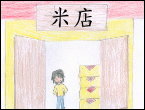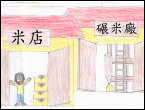|
◆《It is difficult to differentiate rice logistics industries
-Exemplified by Wang Yong-Ching, the God of Taiwan Business
Operation》
Rough rice/paddy cannot be transformed into milled rice/polished
rice in an instant. It is generally impossible for ordinary people
to purchase grain from farming families. This process therefore
became business opportunities. It is also for this reason rice grain
processing related lines of work and commercial activities derived.
Basically, during the rice logistics process in early times, 3 lines
of work existed i.e. processor, wholesale agent, and vendor. The
three roles are explained in the following. The classification and
names are general names. In actual, operators may act as two or
three of these roles. There is no clear distinction and it is rather
complex.
Take Wang Yong-Ching, God of Taiwan Business Operation for instance;
he used to be a worker at a rice store when he was young. One year
later, he setup his own rice store. Because his services were good,
he purchased rice milling facilities to mill rice and sell it.
Afterwards, he rented a rice milling factory. He acted as a
wholesaler and distributed milled rice to rice stores. A rice
merchant like Wang basically plays all three roles. In other words,
he is a vendor, a processor, and an agent.
 |
 |
 |
| Worker at rice
store |
Rice store owner who
acts as rice vendor |
Rice vendor, rice milling
operator, agent |
Early period rice logistics procedures
and participation by different lines of work
|
Harvest→〔Agent〕→dehusking/dehulling
processing→〔Agent〕→rice refining processing→〔Agent〕→Sale |
|
Potential agent participation |
Potential participation during processing |
Potential sales participation |
|
Large rice vendor〔Major agent〕
Small rice vendor〔Minor agent〕
Intermediary〔Individual〕
soil grind room
milled rice/polished rice store |
Farmer〔Privately setup soil grind room〕
soil grind room
milled rice/polished rice store |
Rice store〔Mi-jiao〕
Rice vendor〔Rice store〕
Grocery store〔Variety store〕
Shoulder carrying pole and load carrier〔Individual〕
soil grind room
milled rice/polished rice store
|
◆《Agent-rice intermediary, Chien-mi-hou》
A wholesale agent normally plays the role of the intermediary during
buy and sale. This line of work is frequently called “intermediary
store” or “Chien-mi-hou.” An agent in this type of rice intermediary
is known as a” rice intermediary”, or “Chien-mi-hou.” He plays
similar roles as a “rice dealer” in modern times. An agent is in
charge of coordinating and outsourcing peasants, processors, and
merchants. This kind of merchant is further categorized into: large
rice vendor〔Major rice vendor〕, small rice vendor〔Minor rice
vendor〕, and Intermediary〔independent agent, Chien-mi-hou〕etc.
◆《Processor-soil grind room, milled
rice/polished rice store》
A processor refers to one specializing in dehusking/dehulling, and
rice refining. In earlier times, dehusking/dehulling and rice
refining operations were important. “Soil grind room” is responsible
for dehusking/dehulling while “milled rice/polished rice
store”〔mostly located in cities and towns〕is responsible for rice
refining. Certainly, affluent people possessed both equipments. They
were both dehusking/dehulling operators and rice refining operators.
During the Japanese colonial period, the Japanese called “Soil grind
room” type of rice milling operators as “rice refining “rice
refining machinery”〔usage in Japan〕, or the so-called rice milling
factory (Mi-jiao)
Normally rice refining is outsourced at “Soil grind room” or” milled
rice/polished rice store.” However, dehusking/dehulling did not
necessarily follow similar patterns. Dehusking may be done by
peasants by collectively funding for soil grinders to setup
mini-sized soil grind rooms for dehusking/dehulling. During the
Japanese colonial period, electronic rice millers were introduced.
Gradually, they became prevalent. Rice milling operators believed
that rice refining machineries became consistent and highly
specialized.
Generally speaking, “soil grind room” and “milled rice/polished rice
stores” ought to help peasants or agents find outsource so
commission can be charged. Nevertheless, at times, these processors
also played the role of the agent and became wholesale agents.
Similarly, rice sales were also conducted making them vendors as
well. In addition, “soil grind room” operators often resided in the
country, and most were land owners. Thus, they are often loan
sources and grain storage areas for peasants.〔dehusking/dehulling
operators normally construct rice barns to store rough rice/paddy〕
◆《Vendor-Mi-Jiao, rice vendor》
A vendor mainly engaged in rice vending works. Rice store〔Mi-jiao〕,
rice vendor〔rice store〕or grocery store〔variety store〕were
collectively called “vendors.” Meanwhile, “milled rice/polished rice
stores” engaged in major trades. They are also regarded as vendors.
Rice stores〔Mi-jiao〕were usually exporters while rice vendors and
grocery stores sold rice to stores that in turn sold rice to
consumers. The difference lies in the fact that one is a specialty
store, and the other is a variety store. Some individual vendors
also carried a shoulder carrying pole and the load carried to be
sold around. These people are called “a shoulder carrying pole and
the load carrier.” They are similar to the moving street vendors as
we know them now.
◆《Changes in traditional Taiwanese rice and grain logistics by the
Japanese》
After the Japanese took over governance in Taiwan, they found
Taiwanese rice to be undesirable so they introduced upgraded
Japanese rice, Peng Lai Rice, which suited the Japanese taste.
Obviously, the point of rice export at the time was Japan. Rice
exports were entirely controlled by Japanese merchants during which
time. Taiwanese people had little control over it but local
Taiwanese rice and grain logistics generally maintained its original
form.
Since “soil grind rooms”〔operators were often land owners〕had always
charged peasants usurious interest rates and techniques varied in
quality, during mid-late Japanese reign, the Board of Authorities
offered assistance in the growth of “industry cooperatives”, and
“credit cooperatives”(The two and other cooperatives later
reorganized into Association of Agriculture, or the forerunner of
the present Farmers’ Association.” It engaged in rice grain export
and peasant loan granting. As the war progressed, a series of
intensified rice grain logistics regulations were implemented.
Eventually, grains harvested by peasants had to be all sold to the
government. The rice grain logistics system was under complete
control of the government. Rice milling processors were not able to
profit so many closed down. As introduced earlier, rice merchant
Wang Yong-Ching was also forced to end his rice selling business
temporarily.
|